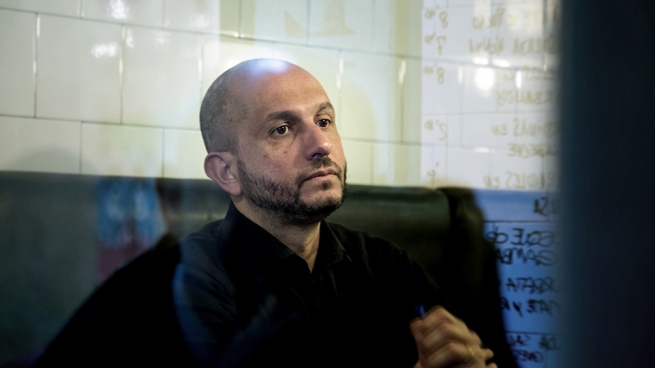The Spanish writer Jorge Carrión presented his latest work, “Membrana”, at the Book Fair, an atypical narrative that takes place in a 21st-century museum, a dystopian space whose curatorial script is narrated in the year 2100 by an artificial intelligence: “If Although many readings have insisted on the novel’s coldness, it also speaks of the technological desire to feel love, to feel contact,” the author pointed out.
“You wrote a novel about algorithms that fuck,” Cristian Alarcón joked during the presentation in the Ernesto Sábato room, at which time the auditorium burst into laughter, a room full of people. The talk started with strict punctuality, almost at the same time that, outside the blue pavilion of La Rural, a crowd stopped to listen to Cristina Kirchner’s live speech from the AM750 stand. Applause inside and outside the room.
“I wanted to imagine forms of dialogue between Artificial Intelligence and humans. The novel talks about it, but not from the point of view of humans, but from that of intelligences, they, or them, since they are post-gender. Even I thought of writing the entire novel in inclusive but it would have been risky on my part. That would be to think that in the year 2100 this will continue to be the way of naming us, “explained the Spanish writer about the story that through numerous works of art realizes the ancestral relationship of humanity with technology.
Published by Galaxia Gutenberg and winner of the City of Barbastro International Prize, the publication – whose cover is illustrated with a work by the Argentinean Tomás Saraceno, made with spider webs – narrates the itinerary through the museum while interweaving elements such as neural networks that finally dominate the human species, intelligences that want to know what human sexuality means, algorithms with human characteristics. So much so that they begin to acquire rights. “They, in effect, cannot stop weaving, plotting, conspiring,” said the Spanish author, about the work where the legalization of the marriage between the human being and the machine takes place.
“It’s a novel full of love,” retorted the author of “When I die I want them to play cumbia for me” to which Carrión pointed out that “it is a novel narrated by Artificial Intelligence, and therefore, the protagonists are the algorithms. There is no robots, there are no bodies, they are mathematics that is flowing in a kind of cyberspace. And humans are the antagonists. “
Jorge “Jordi” Carrión pointed out that there are two humans in the novel: Ben Grossman, a drone driver who realizes that the drone is acting on its own (and commits an attack) and Karla Spinoza, a sort of Steve Jobs, who believes algorithms and is responsible for causing hybridizations.
“I wanted to imagine forms of dialogue between Artificial Intelligence and humans. The novel talks about it, but not from the point of view of humans, but from that of intelligences, they, or them, since they are post-gender. Even I thought of writing the entire novel in inclusive but it would have been risky on my part”
“It seemed interesting to me not to talk about the man who becomes a machine but the machine that embodies biology. Let the internet run through your veins,” said the Spaniard, also author of the fictions “The dead”, “The orphans” and essays such as ” The viral” and “Barcelona”.

The novel is an itinerary through the rooms of the museum that in the year 2100 narrate history, while including Alan Turing, videos of kittens, Netflix or the first genetic map of a chromosome, while imagining events such as the first guided cultural route by androids or the planet Mars turned into a colony of humanity.
And what is the ‘against reality’ that appears in the novel? Alarcón asked him, to which Carrión replied: “Let no one be offended, but it is the mother who gave you a thousand births. There is a lot of Argentinism in the novel -explained the author who lived for a time in Buenos Aires and Rosario- The expression ‘because of doubts and debts’ is repeated a lot, which is very Argentinian; it is a game with an idea of panlengua, of expanded Castilian Spanish of the future. And it also plays with the idea of religious language, which is repeated like a mantra”, he reeled off, referring to the theory of the philosopher Boris Groys who maintains that technology becomes increasingly religious because it covets eternity.
And Carrión exemplified: “Karla Spinoza’s character invents an application to write with text and the app transforms it into internet code. That is the parallel reality, or the counter reality.”
“It seemed interesting to me not to talk about the man who becomes a machine but the machine that embodies biology. May the internet run through your veins”
On the other hand, the Spaniard pointed out how remarkable it is that human beings have more and more intermediation mechanisms with the world: “In the novel, for example, hybrids begin to be exploited and Airbnb creates a service in which you, from your house, through hybridization, you can feel how someone travels for you; if someone walks through Venice, you feel what it means to walk through Venice”.
Alarcón -recent winner of the Alfaguara Novel Prize- said that “Membrana” is “a novel that deceives, as good literature should do” and a playful example of “how to stage something different, breaking the classic structures of the 20th century novel XX to enter the XXI century. It is labyrinthine, at times confusing, almost baroque, with a large number of gadgets. And it is a withering commitment to creative freedom. The possible extinction of the human species and the narrator, or le narrador, It is this artificial intelligence with sensitivity. The hybrid is the great theme of the novel, due to the desire of the technological to feel love, “he said.


















